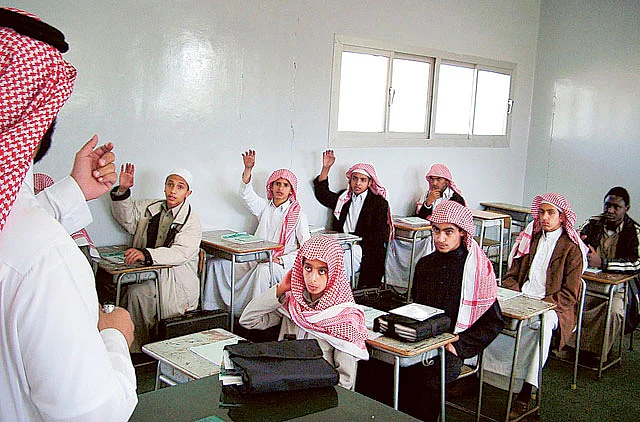The Saudi Food and Drug Authority (SFDA) had approved this past week to include children in the age group of 5-11 years among those who are allowed to receive the Pfizer vaccine in the Kingdom. This will soon translate to the eventual return of primary grade students back to the classrooms.
When Saudi schools opened in late August of this year, there was a lot of trepidation from all quarters. Everyone involved — from the education ministry to school officials, parents to the students themselves — was uncertain on how the reintegration back to campus life would pan out. Initially, middle and high school students along with university students were required to make an on-site presence.
The government for the most part has played its role in ensuring a smooth and safe return to the classroom environment. Over SR 1 billion riyals has been spent in the last few months to upgrade facilities in accordance with the protocols initiated during the pandemic along with guidelines to school officials and administrators on how things will be different this time around.
The health ministry has managed to ensure the vaccination of 97% of students age 12 and above to help contain the virus menace.
The Education Ministry emphasised that students aged 12 and above who have not been fully vaccinated would not be able to attend in-person classes and as such would be considered absent until they receive their second dose of the vaccine. The daily numbers of coronavirus cases attest to that as they have dropped down to less than 50 daily.
Back on track
The Saudi minister of Education stated that “University students and those of the like who have not completed two doses of the vaccine will not be allowed to attend, and their registration will be suspended. They will be considered absent until the second dose is completed. Middle and high school students who have completed two doses are required to attend educational facilities, and those who did not complete the two-dose vaccination will be considered absent until the two-dose vaccination is completed.”
The Saudi authorities are eager to get all the children back on track. In a joint statement issued by officials at UNESCO and UNICEF earlier in July of this year, the importance of attendance was highlighted.
“The losses that children and young people will incur from not being in school may never be recouped. From learning loss, mental distress, exposure to violence and abuse, to missed school-based meals and vaccinations or reduced development of social skills, the consequences for children will be felt in their academic achievement and societal engagement as well as physical and mental health. The most affected are often children in low-resource settings who do not have access to remote learning tools and the youngest children who are at key developmental stages. The losses for parents and caretakers are equally heavy. Keeping children at home is forcing parents around the world to leave their jobs, especially in countries with no or limited family leave policies. That’s why reopening schools for in-person learning cannot wait.”
Strictly enforcing COVID-19 protocols
Saudi children who have spent a year and a half sequestered at home in from of a screen as they carried on with their daily online tutoring initially found it somewhat discomforting to be thrust into the reality of a new school year with classrooms, live teachers and a host of fellow students around.
But attend they did and there have no reports of breakouts in classrooms as had been initially feared. The government continues to strictly enforce COVID-19 protocols in all public places and that has contributed to the significant decline.
With primary schoolchildren soon to follow their elder peers to schools, parents are naturally anxious. While many parents are relieved to see things going back to normal, they understand that the threat still exists and has not fully gone away.
A father whose two children begin primary school this year expresses his fears. “Even though I have repeatedly advised my children on the new social behaviours at school and the constant hygienic processes they must follow, I cannot help be a bit anxious. They are young and perhaps too naive to understand the dangers.”
Another parent has even more to worry about. “My elderly and frail mother lives with us and having my 7-year-old son come in and out of the house and mix with large numbers in school is a source of great worry for me. If something were to happen to my mother, I would not be able to forgive myself.”
Concerns of parents with young children are understandable in light of the prevailing threat.
Tariq A. Al Maeena is a Saudi sociopolitical commentator. He lives in Jeddah, Saudi Arabia. Twitter: @talmaeena
Sign up for the Daily Briefing
Get the latest news and updates straight to your inbox
Network Links
GN StoreDownload our app
© Al Nisr Publishing LLC 2026. All rights reserved.
